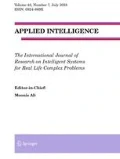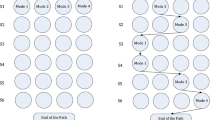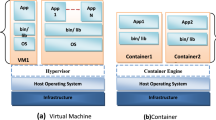Abstract
Enabled to provide pervasive access to distributed resources in parallel ways, heterogeneous scheduling is extensively applied in large-scaled computing system for high performance. Conventional real-time scheduling algorithms, however, either disregard applications’ security needs and thus expose the applications to security threats or run applications at inferior security levels without optimizing security performance. In recognition of high reliability, a security-aware model is firstly presented via quantization of security overheads of heterogeneous systems. Secondly, inspired by multi disciplines, the meta-heuristic is addressed based on the supercomputer hybrid architecture. On the other hand, some technological breakthroughs are achieved, including boundary conditions for different heterogeneous computing and cloud scheduling and descriptions of real-time variation of scheduling indexes (stringent timing and security constraints). Extensive simulator and simulation experiments highlight higher efficacy and better scalability for the proposed approaches compared with the other three meta-heuristics; the overall improvements achieve 8 %, 12 % and 14 % for high-dimension instances, respectively.









Similar content being viewed by others
References
Abdelzaher T, Shin K (1999) Combined task and message scheduling in distributed real-time systems. IEEE Trans Parallel Distrib Syst 10(11):967–985
Ahmed Q, Vrbsky S (1998) Maintaining security in firm real-time database systems.. In: Proceedings of 14th Ann. Computer Security Application Conference, pp 83–90
Ali S, Siegel HJ, Maheswaran M, Hensgen D (2000) Task execution time modeling for heterogeneous computing systems.. In: Proceedings of heterogeneous computing workshop, pp 185–199
Apvrille A, Pourzandi M (2004) Xml distributed security policy for clusters. Computers & Security J 23(8):649–658
Braun TD, Siegel HJ, Beck N, Boloni LL, Maheswaran M, Reuther AI, Robertson JP, Theys MD, Yao B, Hensgen D, Freund RF (2001) A comparison of eleven static heuristics for mapping a class of independent tasks onto heterogeneous distributed computing systems. Journal of Parallel and Distributed Computing 61(6):810–837
Chan HL, Chan J (2009) Optimizing throughput and energy in online deadline scheduling. ACM Trans Algorithms 6(1):1–10
Cheng S, Huang Y (2004) Dynamic real-time scheduling for multi-processor tasks using genetic algorithm. In: Proceedings of the 28th annual international computer software and applications conference, pp 154–160
Connelly K, Chien A (2002) Breaking the barriers: high performance security for high performance computing.. In: Proceedings of workshop new security paradigms, pp 36–42
De Falco I, Della Cioppa A (2012) Biological invasion-inspired migration in distributed evolutionary algorithms. Inf Sci 207:50–65
Fernandez-Martinez J, Garcia-Gonzalo E (2011) Stochastic stability analysis of the linear continuous and discrete pso models. IEEE Trans Evol Comput 15(3):405–423
George B, Haritsa J (1997) Secure transaction processing in firm real-time database systems.. In: Proceedings of ACM SIGMOD Conference, pp 462–473
Gurouta T, Medjiah S (2014) Quality of service modeling for green scheduling in clouds. Sustainable Computing: Informatics and Systems (4): 225–240
Han X, Lam TW (2010) Deadline scheduling and power management for speed bounded processors. Theor Comput Sci 411(40-42):3587–3600
Hsieh FS, Lin JB (2014) A dynamic scheme for scheduling complex tasks in manufacturing systems based on collaboration of agents. Appl Intell 41(2):366–382
Irani S, Shukla S, Gupta R (2007) Algorithms for power savings. ACM Trans Algorithms 3(4):1–41
Jih-Yiing L, Ying-ping C (2011) Analysis on the collaboration between global search and local search in memetic computation. IEEE Trans Evol Comput 15(5):608–623
Le CV, Pang CK, Gan OP, Chee XM, Zhang DH, Luo M, Chan HL, Lewis FL (2013) Classification of energy consumption patterns for energy audit and machine scheduling in industrial manufacturing systems. Trans Inst Meas Control 35(5):583–592
Li B, Zhou Z, Zou W, Li D (2012) Quantum memetic evolutionary algorithm-based low-complexity signal detection for underwater acoustic sensor networks. IEEE Trans Syst Man Cybern Part C Appl Rev on 42(5):626–640
Liu C, Layland J (1973) Scheduling algorithms for multiprogramming in a hard real-time environment. J ACM 20(1):46–61
Luo P (2007) A revisit of fast greedy heuristics for mapping a class of independent tasks onto heterogeneous computing systems. Journal of Parallel and Distributed Computing 67(6):695–714
Ma Y, Gong B, Sugihara R, Gupta R (2012) Energy-efficient deadline scheduling for heterogeneous systems. J Parallel Distrib Comput 72(12):1725–1740
Nesmachnow S, Cancela H, Alba E (2012) A parallel micro evolutionary algorithm for heterogeneous computing and grid scheduling. Appl Soft Comput 12(2):626–639
Pant A, Jafri H (2004) Communicating efficiently on cluster based grids with mpich-vmi.. In: Proceedings of IEEE international conference on cluster computing, pp 23–33
Poli R (2008) Dynamics and stability of the sampling distribution of particle swarm optimisers via moment analysis. Journal of Artificial Evolution & Applications 2008(2008):1–10
Ramamritham K, Stankovic J (1984) Dynamic task scheduling in distributed hard real-time system. IEEE Softw 1(3):46–61
Son S, Mukkamala R, David R (2000a) Integrating security and real-time requirements using covert channel capacity. IEEE Trans Knowl Data Eng 12(6):865–879
Son S, Zimmerman R, Hansson J (2000b) An adaptable security manager for real-time transactions.. In: Proceedings of 12th Euromicro Conf. Real-Time Systems, pp 63–70
Stankovic JA, Spuri M, Ramamritham K, Buttazzo GC (1998) Deadline scheduling for real-time systems-EDF and related algorithms. Springer, pp 72–65
Subramani V, Kettimuthu R, Srinivasan S, Johnston J, Sadayappan P (2002) Selective buddy allocation for scheduling parallel jobs on clusters.. In: Proceedings of IEEE Intl Conf. Cluster Computing, pp 107–116
Vallee G, Morin C, Berthou JY, Rilling L (2003) A new approach to configurable dynamic scheduling in clusters based on single system image technologies.. In: Proceedings of international symposium parallel and distributed processing, pp 107–116
Wright R, Shifflett D, Irvine C (1998) Security architecture for a virtual heterogeneous machine.. In: Proceedings of 14th Ann. Computer Security Applications, pp 167–177
Xu Lz, Zhang Jj, Bao Zj, Cao Yj (2013) A comparative study between ipso and mip for co-ordinated scheduling of electricity and heat within a microgrid. Transactions of the Institute of Measurement and Control 35(4):444–456
Zhang N, Feng Zr, Ke Lj (2011) Guidance-solution based ant colony optimization for satellite control resource scheduling problem. Applied Intelligence 35(3):436–444
Zhang Y, Sivasubramaniam A, Moreira J, Franke H (2001) Impact of workload and system parameters on next generation cluster scheduling mechanisms. IEEE Trans Parallel Distrib Syst 12(9):967–985
Author information
Authors and Affiliations
Corresponding author
Additional information
National High Technology Research and Development Program of China(863 Program) (No.2006AA01A113 and No.2012AA01A306) and National Natural Science Foundation of China (No.61070017 and No.61272094)
Rights and permissions
About this article
Cite this article
Wang, J., Gong, B., Liu, H. et al. Multidisciplinary approaches to artificial swarm intelligence for heterogeneous computing and cloud scheduling. Appl Intell 43, 662–675 (2015). https://doi.org/10.1007/s10489-015-0676-8
Published:
Issue Date:
DOI: https://doi.org/10.1007/s10489-015-0676-8




